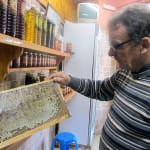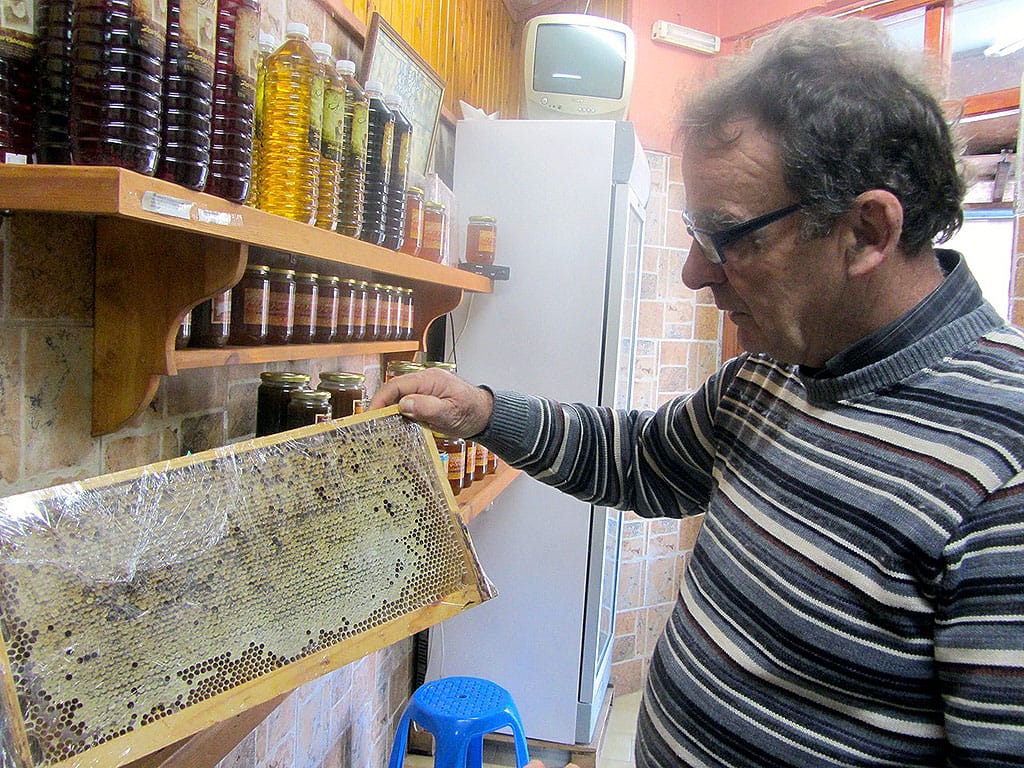One of the tenets of the Slow Food movement is that it’s impossible to make a really good meal out of industrial food. Of course certain ingredients can pass muster with diners even if they’re grown on an industrial farm. Yet sustainable farming has an obvious impact – it’s not just a matter of better tasting and healthier food but also environmental and societal benefits.
In Barcelona, we are surrounded by a large number of independent, sustainable producers that, too often, are completely invisible. They work in nearby provincial areas such as El Prat, El Penedès, El Vallès, El Garraf and El Maresme that give forth a veritable cornucopia of food goods: vegetables, fruits, nuts, legumes, olive oil, cheese, marmalades, cereals, flours, honey, meat, fish, wine, vermut, beer and more. These producers work hard every day to remain independent and adhere to stringent standards of sustainability and quality.
For example, many of the Slow Food convivia and restaurants around Barcelona collaborate with El Peix al Plat, a project started by two biologists who work with local fishermen on the El Maresme coast to supply a variety of sustainable fish directly to clients and cooperatives. One of the local fishing preservation’s main aims is to shift the focus from popular species that are often overfished to the many other types of fish that may not be as famous, but are just as tasty.
When it comes to meat, the goal is ensure that animals live under humane conditions. In El Vallès, Josep Cases and his wife, Montse Martínez, saw to this when they transitioned their farm, La Soleia, from industrial to organic veal meat production in 2007. Previously, Cases had fattened cattle for other companies, buying grain from industrial producers. Over time, he began to observe that keeping up with the demand for fast meat at low prices was degrading both his own work and the lives of the animals – the latter spent their short, medicated lives mired in muck.
These producers are a quiet reminder that farm-to-table cuisine would be nothing without the farm.
Casas decided to step back and rethink his approach. Taking a fresh look at his land, which is nestled in a beautiful valley in Gallifa and backed by Sant Sadurní mountain, Casas – who comes from a family of cattle and dairy farmers – decided to honor his roots and return to smaller-scale farming. Even though it initially compromised their economic stability, Casas concluded that going organic was the right thing to do. The farm now grows its own organic cereals for feed, keeps its cattle hormone-free, its calves fed on their mother’s milk and offers high quality meat at a fair price. Their humane meat is served in several Slow Food restaurants, public schools and food co-ops.
Another exceptional producing area involved with the Slow Food movement is Gallecs, only 20 km from Barcelona. Of the area’s 733 hectares, a modest 25 are used for organic cultivation. Here, farmers and the Catalan Government work together as a consortium, despite their history of conflict. In 1970, under Franco’s dictatorship, these lands were expropriated by force to construct a large city that was ultimately never built. Some farmers decided to remain on their land and resist. As Marina Duñac from Can Jornet, one of the several old masias (farmsteads) in Gallecs explained to us, the current farming space and project can be traced back to these families.
After the death of Franco in 1975, the building project was stuck in legal limbo. In 1978, the area was half abandoned and squatters arrived from Barcelona to cultivate the abandoned lands; together with the farmers, they created a defense committee to reclaim the land, raising awareness of their cause with music festivals and demonstrations. The land, still zoned for commercial development, was then passed to the Government of Catalonia, which asserted its right to the territory. After years of struggle, the government eventually passed several laws of protection and granted cultivation licenses before finally creating the current consortium and recognizing the area as a Space of Natural Interest.

Gallecs has been linked to Slow Food since 2003 and began organic production in 2005. The local farmers working here have recovered old seed varieties that were native to the region and use them to grow natural and organic produce and also produce organic foodstuff of all kinds, such as cereals and flours, eggs, marmalades, preserved vegetables and sauces. Many Barcelonans pick up these goods at a shop in the area, which also doubles as a great spot for walking and biking.
These small producers are turning their backs on big industry and creating sustainable, high quality products at a fair price, a quiet reminder that farm-to-table cuisine would be nothing without the farm.
 November 6, 2018 Building Blocks
November 6, 2018 Building Blocks
The Delta de l’Ebre is a magical part of southern Catalonia’s Tarragona region. A flat […] Posted in Barcelona September 27, 2023 Building Blocks
September 27, 2023 Building Blocks
Editor's note: Our recurring feature, Building Blocks, focuses on foods and ingredients […] Posted in Athens July 4, 2023 Building Blocks
July 4, 2023 Building Blocks
The city of Naples sits nonchalantly in the shadow of Vesuvius, which has remained quiet […] Posted in Naples
Published on July 13, 2017
Related stories
November 6, 2018
BarcelonaThe Delta de l’Ebre is a magical part of southern Catalonia’s Tarragona region. A flat swampy area where the Ebro River meets the sea, the delta contains within its confines a natural park rich in fauna and flora as well as 20,500 hectares of rice fields; the ecosystem allows both to coexist in harmony. The…
September 27, 2023
AthensEditor's note: Our recurring feature, Building Blocks, focuses on foods and ingredients that are fundamental to the cuisines we write about. This may come as a surprise, but little Greece is Europe’s fourth most important honey producer after Spain, Germany and Hungary. Every year, between 12,000 and 17,000 tons of this liquid gold are stolen…
July 4, 2023
Naples | By Kristin Melia
NaplesThe city of Naples sits nonchalantly in the shadow of Vesuvius, which has remained quiet – yet active – since the famous eruption in 79 A.D. that destroyed Pompeii and Herculaneum. Despite its prominence, Vesuvius is not even the most powerful volcano in Napoli. That distinction belongs to the Phlegraean Fields, an underground caldera that…



















































































